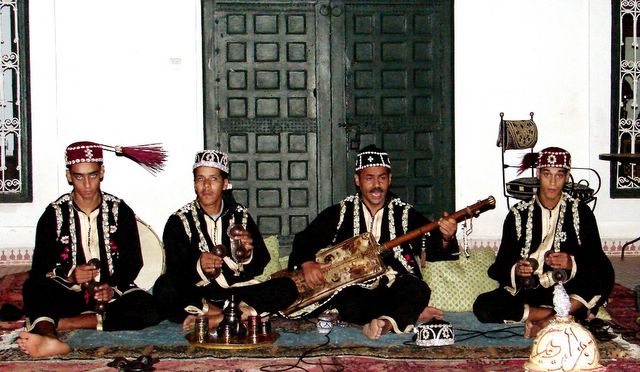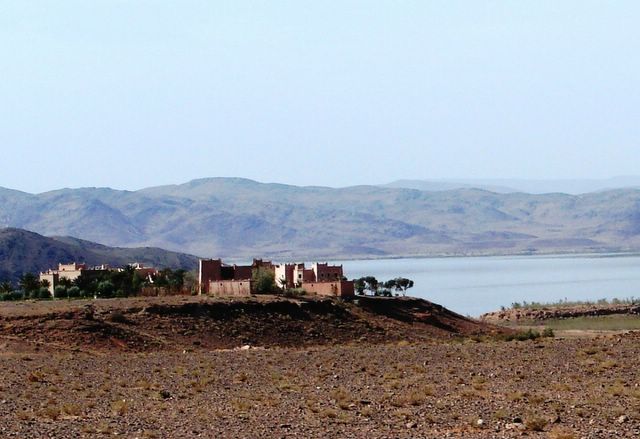A First Step for the Women of Kuwait
 Congratulations to the women and men of Kuwait who marched into the Kuwaiti Parliament building last month demanding political rights for women in this tiny Gulf nation (see picture). Yesterday, the Kuwaiti National Assembly voted to grant its provisional approval for women to vote and contest municipal council elections. Twenty six MPs, including 12 ministers present in the session, voted for the law while 20 voted against and three MPs abstained. Eight MPs did not take part in the voting because they did not attend the session. The vote was divided along partisan lines in that liberal lawmakers voted for the law while almost all tribal and Islamist MPs opposed it.
Congratulations to the women and men of Kuwait who marched into the Kuwaiti Parliament building last month demanding political rights for women in this tiny Gulf nation (see picture). Yesterday, the Kuwaiti National Assembly voted to grant its provisional approval for women to vote and contest municipal council elections. Twenty six MPs, including 12 ministers present in the session, voted for the law while 20 voted against and three MPs abstained. Eight MPs did not take part in the voting because they did not attend the session. The vote was divided along partisan lines in that liberal lawmakers voted for the law while almost all tribal and Islamist MPs opposed it.The second and final round of voting on the law is scheduled to take place on May 2nd. MPs also approved a second bill to delay municipal council elections until October to allow women to register as voters and participate for the first time in the upcoming election. The Municipal Council consists of 16 members, 10 of them are elected the same way Assembly elections are done while the remaining six are appointed by HH the Amir Sheikh Jaber Al-Ahmad Al-Sabah. Its main powers are to organize and regulate civic affairs like construction, land distribution for different uses and issuing decisions regarding urban development.
The Kuwaiti Prime Minister, Sheikh Sabah, told reporters after the session: "Thank God, because the first step towards women's rights has been taken" he added : "I would like to congratulate my sisters for obtaining their rights in the municipality and they will get their other rights in voting and contesting National Assembly elections too" .
Women activists gave a cautious welcome to yesterday's decision, saying more was needed. Head of Kuwait Economic Society, Rula Dashti, who was present during the vote, thanked all ministers and MPs who voted for the law and urged a number of MPs who opposed it to change their mind. "We were worried that women may not be able to participate in municipality elections. What happened today is a major gain for Kuwait and democracy. I hope some women will contest the elections," she said. "I hope the major step of women reaching parliament will happen. Our aim is to broaden democracy in Kuwait," she added. But rights activist Naima Al-Shayeji was afraid yesterday's win would cause supporters to lose momentum and women will have to wait for years to get full rights. "Why do Kuwaiti women have to get their rights in doses?" she exclaimed.
Nonetheless, Faisal Al-Muslim, a fundamentalist lawmaker, who voted against the measure warned: "This is just a first reading, most of those who were absent today oppose women's political rights." He added: "People still reject women's participation in politics."


























8 Comments:
I think it's an important first step. Women in the United States got "their rights in dozes" as well. Reforms take time, since mentality has to be overcome, not just legislature.
April 20, 2005
That's incredible. I am so glad for Kuwait and the women specifically. I wonder how long it will take for women to become fully emancipated. Venture a guess?
April 20, 2005
j'encourage ces femmes pour continuer!! le premier pas et tjrs le plus imporant ds notre chemin!
merci jawad.
April 20, 2005
Bien trop de femmes dans bien trop de pays parlent la même langue : le silence.
il serait peut être grand temps qu'on leur donne l'occasion de s"exprimer autrement.
April 20, 2005
The Arab woman is such a wonderful and beautiful woman. I have deep love for her because she has suffered with dignity and courage. I hope you get to meet her one day because she is truly a remarkable woman.
Irina: That's where the toughest and longest fight resides: in changing norms and mentalities. See, all of these political and legislative reforms would be absolutely useless if they are not backed by real institutional frameworks and popular will. Society is basically organized in 4 hierarchical levels:
1. Norms & Beliefs
2. Institutions
3. Policy-making
4. Resource Allocation
Most reforms that international financial institutions talk about are usually focused on the last two levels. Recently (late 1990s on), orgs such as the World Bank and IMF realized that those boiler-plate reform plans they have been dishing out (i.e., Washington Consensus) don't always work because they ignore the significance of sound institutions. The point you raise and which I completely agree with is that even that is not complete without affecting norms in a positive way, which obviously takes time. This is why I believe that the biggest challenge facing the Middle East is Human Development.
Lauren: My guess is that it will take less time than it has taken the West mainly due to the realities of the world today (especially advances in com tech). But what is important to understand is how significant the traditional and cultural element is in all of this.
Meriam et Ninine: Elles ont bien fait le premier pas et on est derrière elles espérant que ça continue. Il est temps pour que l’homme se rectifie auprès de la femme Arabe ; Une femme que j’admire bcp pour sa bonté et son courage.
April 20, 2005
BTW, the second and final round of voting on the law is scheduled to take place on May 2nd. So this is not a done deal in Kuwait yet.
April 20, 2005
Jawad, it's interesting that you mention the Human Development factor. I've been reading Akira Iriye's book about Globalized Community, and he attempts to rank the important factors in international understanding: Peace and Disarmament, Human Rights, Humanitarian Relief, Developmental Assistance, Environmental Protection, and Cultural Exchange. We had a debate about which one should be the most important, and I argued that Cultural Exchange should be the basis for even such unquestionably essential factors as Developmental Assistance and Human Rights. There's no point dumping loads of money for programs if they are misused by inept institutions or if the way they are applied is going to be so different from the way we envision as to serve no purpose. I wonder whether it's possible to change the norms and beliefs on "their" terms. How to deal with Human Development and problematic institutions without antagonizing everyone involved?
April 21, 2005
Karim: Thank you for the kind compliment and welcome to my Blog. Very happy to have you.
I agree with you that this will take a long time. I just believe that it will take less time than it took the West (~50-60 years [hopefully] as opposed to the 3 centuries it took the West since Enlightenment). When I said: "what is important to understand is how significant the traditional and cultural element is in all of this.", I alluded to two things: (1) The importance of the first level of societal hierarchy in the Middle East as you eloquently described. (2) The fact that what a Western woman may call ‘emancipation’ may not match the Arab woman’s own definition of the same word due to different and complex traditions and norms - Basically cautioning that we ought to give context to meaning on these kinds of issues.
Irina: I believe that, whatever society it is we are talking about, the only way to change norms is to do it on "their" terms and accept that it is a process that takes place over time (no easy routes and no short-cuts). What one can do is force dialogue, promote solid institutions, and generate momentum towards change. But you have to make the change come from "them" and on "their” terms (the change has to become “their” idea). Otherwise it will be fiercely resisted and can be in fact counterproductive to reform.
April 21, 2005
Post a Comment
<< Home